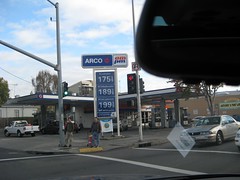
|
|||||||||||||||||||||||||||||||||||||||||||||||||||||
|
Measuring the worth of a blogger
Sometimes it seems some bloggers just subtract, that when they post, others must negate the damage they do. One of their blog posts is an environmental disaster, like an oil spill or a nuclear accident. Of course our presence in the vastness of the universe is infinitesmal, both in time and space, so either way it doesn't make much of a difference. But it's something to consider at the end of a year. How much value did you add to the intellect of the universe in the last 12 months -- and here's best wishes to doing even better next year. On June 29, I took a picture of the prices at a local gas station, thinking they were worth documenting for two reasons: 1. The prices were so shockingly high. 2. I thought they'd continue to go up. In a blog post, I compared them to prices recorded by Google Maps street view of the same station. Yesterday, returning from a lunch in Sausalito, I stopped at the same intersection and took another picture. Instead of going up dramatically, the price of gas had gone down, dramatically. Just goes to show, try to predict the future, the future fcuks with you. Update: One of the cool things about the rise in gas prices earlier this year is that it got a bunch of people to buy these small cars that you see all over Europe. Not just in Berkeley, I saw a bunch of them in NY too. Maybe we should make a deal with Ford and GM and the American people, we'll swap one for one, an old gas guzzling SUV for a modern new high-tech Smart. Could be one of the public works projects of the new New Deal.
Time has Person Of The Year, I have Blogger Of The Year, and InformationWeek has CTO Of The Year, who they just announced is Werner Vogels of Amazon. I heartily endorse this choice. Vogels has led us into the age of cloud computing, a buzzword for sure, but also a kind of software development that holds great promise. For me, it's the next step on a path that began with CompuServe in 1980, when I begged them to let me run software on their server, so I could do great things with their CB Radio environment. Of course they wouldn't. Now, Amazon not only lets me run software in their cloud, but the environment I run it is exactly the same environment that runs on my 7-inch netbook computer. That makes my inner software architect very very happy. You just need to write the app for one platform and voila, it's available at 40,000 feet on a jet flying at 600MPH from NY to SF, and who-knows-where (geographically) in Amazon's cloud. I actually logged onto my server from the jet using Remote Desktop Connection. I knew it would work, but I just had to try it to say I'd done it. It did work. Now Werner had the vision to do all this, and more -- and to somehow get the huge organization that Amazon is to ship it with the vision intact. That's what CTOs do, their work is more prosaic than ideological, although ideology is important. The main thing the CTO does is get the organization to do important things. I don't know how he does it, it's a skill I don't have, but I'm in awe of it. There's another thing to commend Vogels, he reads this blog. No joke, to me that's important, because we have a basis for communication. We've only met once, but he was instantly familiar because of the email exchanges we've had. Now from time to time I shoot an idea over his way, something I'd like to see Amazon do in their cloud, and he never says one way or the other if they're going to do it, but sometimes the ideas do come out. Whether I was an impetus or not doesn't matter -- I'm happy when I get what I wanted. A few months ago I suggested they implement the back-end of a Twitter-like service as part of the Amazon cloud. This was back when Twitter was having huge trouble keeping the service up. Now they're not having that problem, Twitter is much more reliable, but I think it's still a good idea, and I wonder if we even need Amazon to do it. It might be possible to build what I want using the services they already provide. Let's give it a go. Viewed from the cloud perspective, my Twitter stream, the one I read, is a sequence of 140-character bits of text with several attributes. Easy to represent in SimpleDB or S3. Then the question is who has the right to insert something into that sequence? The answer is the people I follow. So there must be a way to represent that, again SimpleDB would have no trouble doing that. That list is publicly readable but only I can write to it. Now that's something I have to look into. Does SimpleDB offer permissions like that? I know S3 does. So maybe my follow list should just be stored in S3. It's very much like an RSS subscription list, and we have many years of experience working with those and a fairly consistently implemented standard. Obviously there's a user interface to Twitter, many of them, but that's not something I would ever expect Amazon to do, that's the province of the developers. This is just an exercise. Not sure if it goes anywhere, but it may be something to get a conversation started. I've also suggested to Evan at Laconi.ca that he offer an AMI on Amazon for an instant microblogging server. But I guess my point, at the end of this rambler, is congrats and thanks to Werner and his team at Amazon for pushing the market in this direction. They're doing good work. |
"The protoblogger." - NY Times.
"The father of modern-day content distribution." - PC World.
One of BusinessWeek's 25 Most Influential People on the Web. "Helped popularize blogging, podcasting and RSS." - Time.
"The father of blogging and RSS." - BBC.
"RSS was born in 1997 out of the confluence of Dave Winer's 'Really Simple Syndication' technology, used to push out blog updates, and Netscape's 'Rich Site Summary', which allowed users to create custom Netscape home pages with regularly updated data flows." - Tim O'Reilly.
My most recent trivia on Twitter. On This Day In: 2007 2006 2005 2004 2003 2002 2001 2000 1999 1998 1997. |
||||||||||||||||||||||||||||||||||||||||||||||||||||
|
© Copyright 1997-2008 Dave Winer. Previous / Next |
|||||||||||||||||||||||||||||||||||||||||||||||||||||
 It occurred to me that one way to measure the worth of a blogger is how much intelligence do they add or subtract to or from the universe.
It occurred to me that one way to measure the worth of a blogger is how much intelligence do they add or subtract to or from the universe. 
 Tis the season for X Of The Year awards.
Tis the season for X Of The Year awards. 

